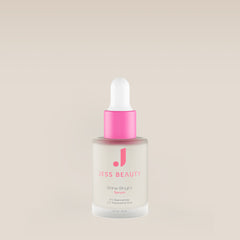In the realm of skincare, dry and dehydrated skin are often thrown around interchangeably, creating confusion and leading to potentially ineffective routines to treat them. While they share superficial similarities, understanding their fundamental differences is crucial to achieve a healthy, radiant complexion. Let's embark on a journey of discovery, peeling back the layers to reveal the true nature of these skin concerns and unlock the keys to their respective treatments.
What is dry skin?

In dry skin, water isn’t the problem. Dry skin is a skin type, characterized by a chronic deficiency in sebum production, the natural oil that acts as our skin's lubricant and protective barrier. It frequently makes your dermis feel tight and dry, with no oil anywhere to be seen, getting worse depending on the climate, season, or activity.
This lack of oil paints a picture of:
- Flaky patches: Dead skin cells accumulate and shed more readily, leaving behind visible flakes, particularly noticeable on the face, elbows, and legs.
- Roughness: Without the skin's natural oils, a dry complexion tends to cut short of its natural smoothness.
- Redness and irritation: The compromised barrier becomes vulnerable to external aggressors, leading to redness, inflammation, and even stinging sensations.
- Increased incidence of psoriasis, eczema, or dermatitis
What causes dry skin?
The palette of factors behind dry skin is diverse, encompassing genetics, harsh weather conditions, inappropriate skincare practices, and even certain medications.
What is dehydrated skin?
While dehydrated skin often looks and feels like dry skin, there's a major difference between the two: Dehydrated skin is a temporary condition arising from a lack of water in the skin's layers that can affect anyone, regardless of skin type, while dry skin is a skin type due to a lack of oil. You can typically tell if your skin is dehydrated if you pinch one of your cheeks and it wrinkles or bounces back to its shape.
This dehydration is often accompanied by flaking and an excessive amount of oil on the skin, although your complexion might still feel very tight and appear duller than usual. The water deficit can stem from poor fluid intake, excessive sweating, diuretic medications, or even prolonged exposure to dry environments.
Dehydrated skin also manifests through:
- Fine lines and wrinkles
- Dark circles under your eyes
- Itchiness
- Dullness and loss of elasticity
- Tightness and discomfort
What causes dehydrated skin?
There are lots of things that can be thirsty culprits to leaving our skin feeling dehydrated. Some of the most common include:
- Sun and heat exposure: These zap moisture like crazy, UVA rays being the main culprit in this case.
- Dry air: Think air conditioning, central heating or even winter winds could be responsible for altering your precious moisture levels. ️
- Sweating: Exercise or hot weather can leave your skin parched.
- Skipping water: Don't forget to drink up!
Tailoring Treatments: Simple steps to keep your skin hydrated
 Internal and external factors can cause your skin to lose water and dehydrate, leading to tightness and discomfort. The key to effectively treating dry and dehydrated skin lies in addressing their distinct needs. For dry skin, the focus is on replenishing oils and strengthening the skin barrier. Your skin may be naturally prone to dryness, so here are some simple steps you can take to protect it:
Internal and external factors can cause your skin to lose water and dehydrate, leading to tightness and discomfort. The key to effectively treating dry and dehydrated skin lies in addressing their distinct needs. For dry skin, the focus is on replenishing oils and strengthening the skin barrier. Your skin may be naturally prone to dryness, so here are some simple steps you can take to protect it:
- Go for gentle cleansers: Harsh products strip away precious oils, further exacerbating dryness. Opt for gentle, hydrating cleansers that remove impurities without compromising the skin's natural balance. The Face Reset Cleanser is a great option for dry skin, made with moisturizers and naturally derived ingredients like squalene and coconut, that will nourish and cleanse your skin.
- Boost your skin with hydrating moisturizers: Look for moisturizers enriched with vitamin E and all-natural ingredients, which attract and retain moisture, plumping up the skin and restoring its protective barrier. Our Silky Smooth Body Balm is enriched with Shea Butter, Calendula Extract, Camellia Sinensis, and Vitamin E for ultimate moisturization and a silky feel.
- Avoid irritants: Harsh exfoliants, alcohol-based products, and extreme hot water can further irritate dry skin. Choose Jess Beauty’s gentle skincare products and prioritize a soothing approach.
Dehydrated skin, on the other hand, cries out for water, water, water! The primary focus is on replenishing hydration:
- Increase your water intake: Aim for eight glasses of water daily to quench your skin from within.
- Moisturize, then moisturize some more: Use humectant-rich moisturizers like our C Bomb Vitamin C Moisturizer, which plays a vital role in moisture Retention. Vitamin C can help strengthen the skin's natural barrier, leading to improved hydration and moisture retention. This is mostly beneficial for those with dry or dehydrated skin.
- Add a serum to your skincare routine: Serums are not moisturizers and vice-versa, they are two different layers of moisture that work as a team to keep your skin hydrated. Serums are made up of tiny molecules, making it much easier to deliver the ingredients deeper into the skin. Moisturizing serums such as Jess Beauty’s Shine Bright Serum, enriched with niacinamide which reinforces our natural moisture barrier and plays an important role in energy metabolism and cell health, attract moisture from the deeper layers of the skin to the surface, providing much-needed hydration.
- Turn down the heat: Reduce indoor heating, open windows occasionally in your home or office, and avoid sleeping with heating or air-conditioning. If your indoor air is too dry, use a humidifier. This helps prevent skin dehydration.
- Take short, warm showers: Hot water can strip your skin of its natural oils, which act as a protective barrier, causing it to become dry and irritated. Shorter, warm showers are less likely to strip away these oils, helping to maintain the skin's moisture.
- Make hydrating skincare a habit: Nourishing, hydrating, and following the proper skincare routine will work wonders to restore the suppleness and brightness of your skin.
By following these Jess Beauty tips understanding the unique needs of your skin and implementing the appropriate care strategies, you can transform your complexion from a parched landscape to a dewy oasis. Your healthy, vibrant skin deserves to shine through!
Remember, if the diagnosis remains murky, seeking guidance from a dermatologist is always recommended. They can assess your skin's specific needs and tailor a personalized treatment to unlock the radiance that lies beneath.












